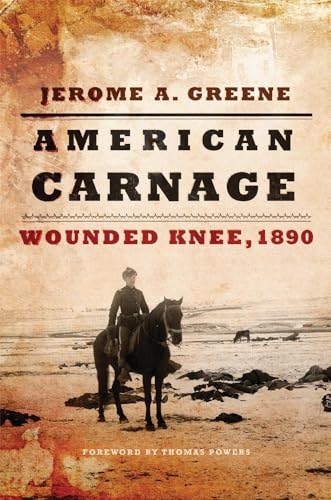American Carnage
Wounded Knee, 1890
Jerome A. Greene
BOOK REVIEW

In the heart of the American story lies a haunting chapter etched in blood and sorrow-a chapter that reverberates through time, urging us to confront our past. American Carnage: Wounded Knee, 1890 by Jerome A. Greene is not merely a historical recount; it is a powerful, visceral invitation to explore the tragedy that unfolded at Wounded Knee, a moment that stands as a chilling testament to the brutal realities of the American expansion and its impact on Native American communities.
As you turn the pages of Greene's meticulously researched narrative, you are thrust into a world where tension brewed and dignity was dashed upon the cold Dakota ground. The year was 1890, and the Ghost Dance-a spiritual movement among the Plains Indians advocating for renewal and resistance-fueled the anxieties of a government desperate to exert control. But this book goes beyond the facts; it captures the raw, unfiltered emotions of despair, hope, and the relentless pursuit of identity.
Greene, using his profound understanding of the historical context, paints a portrait not just of the event itself but of the lives intertwined in its tragic fate. The massacre, a culmination of misunderstanding and aggression, left deep scars not only on the land but also on the collective memory of a people. His approach transcends the sterile recitation of dates and names, beckoning you to feel the weight of history pressing upon your conscience.
Emotions run high as you come face-to-face with the horrors the Lakota faced, stripped of their dignity, their families, and their futures. Greene's writing doesn't allow you to merely read about history; it compels you to confront the cold reality of systemic oppression. The chaos of that fateful day resonates like a thunderclap, making your heart race as you absorb the sheer magnitude of loss. It's not just a story; it's a call to reflect on the nature of justice and the deep-rooted injustices that continue to echo in contemporary society.
Readers have responded to Greene's work with a mix of reverence and anger. Some laud his ability to humanize the historical figures involved, from the soldiers who followed orders to the Native individuals who stood their ground but ultimately faced overwhelming odds. Others grapple with the discomfort of acknowledging these truths, but isn't that the beauty of such a powerful narrative? It forces you to reckon with the past, challenging the sunny narratives often spun about American exceptionalism.
Critics have noted Greene's thoroughness in recounting events, but simultaneously some express discomfort with how the complexity of his narrative might challenge established interpretations of the American West. Regardless, no one can deny that American Carnage opens a necessary dialogue about cultural memory and the responsibilities we carry toward the indigenous peoples of this land.
The power of Greene's work lies not just in its historical accuracy but also in its unflinching examination of the American psyche-a psyche that, to this day, battles against the ghosts of its own making. As you immerse yourself in these pages, you become part of a dialogue that spans generations, where the past is never just a prologue but a persistent presence that shapes today's social fabric.
This is the kind of book that might leave you pondering for days, weeks, even months. It challenges your views, ignites curiosity, and fosters the kind of critical examination that can only lead to a deeper understanding of who we are as a nation. American Carnage is not merely about Wounded Knee; it is about the ongoing struggle for identity, justice, and recognition in a world that often chooses silence over truth.
By the time you reach the final pages, the echoes of that fateful day will haunt you-reminding you that history is not relegated to the past; it is alive, breathing through the present. In Greene's telling, you are not just a spectator; you are invited to partake in a crucial reckoning-a reminder that the past cannot be buried and that understanding it is essential to forging a future where such carnage can never again become the defining story. 🌍✨️
📖 American Carnage: Wounded Knee, 1890
✍ by Jerome A. Greene
🧾 618 pages
2014
#american #carnage #wounded #knee #1890 #jerome #greene #JeromeAGreene